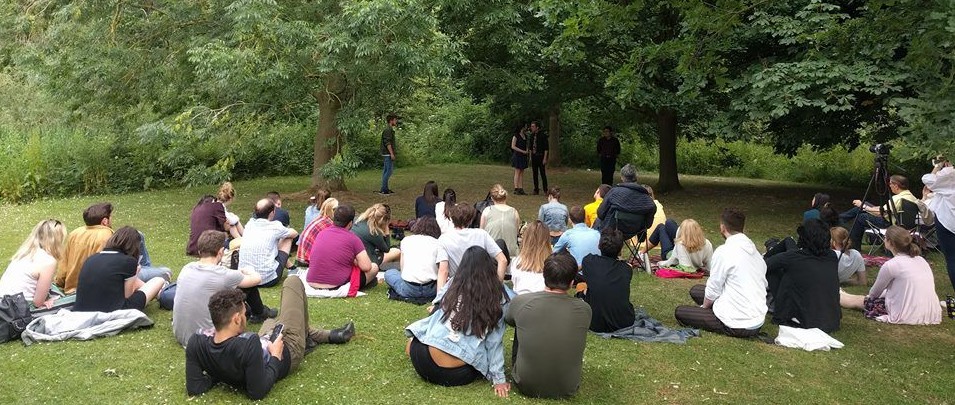Measure for Measure review: Solving the problem of the problem play
Upon hearing that Measure for Measure was one of the choices for this year’s WUDS in the Woods, my feelings were mixed. On the one hand I was excited: this play is an excellent piece of literature but performed infrequently due to it being categorised as a problem play, not quite a comedy whilst also not a tragedy. My overwhelming feeling, however, was nerves, regarding how they were going to recreate this challenging play in a limited space. This play does not fit with previous WUDS in the Woods plays, which have been predominantly comedies set in green spaces, which makes the outdoor setting easier to work with. However, my fears were dispelled within the first few minutes as I realised I was watching a hidden gem of a performance with a talented cast.
The dumbshow before the play began created a buzzing atmosphere. It was lovely to see the director Zoë Morrall and producer Dominic Lam get involved in the dance and you could see how tightknit the cast had become during rehearsals. Setting the scene before beginning the play was a clever idea and I was glad to see the production make use of a tradition which now seems to be dying out.
You could see how tightknit the cast had become during rehearsals
The staging was clever, making the most of the picturesque backdrop of the Bluebell lake and Gibbet Hill woods. There were moments when I became so immersed in the performance I completely forgot I was sat on the floor in the woods and instead I felt like I was at the theatre. It was a nice touch to seat the audience in the middle and have the characters enter either side of us; this touch reminded me of the layout of the Royal Shakespeare Theatre and continuously saw me jumping when characters made grand entrances from behind me.
The scene that stood out to me was when Isabella (played by Olivia Kershaw) switched places with Mariana (Safia Lamrani) who then spends the night with Angelo (Guy Jack). The focal point of this scene is the bed and its connotations, but this scene was cleverly done without props. The cheeky wink to the audience from Mariana had the whole audience erupting into laughter, really capturing the dark humour of the moment. In many other productions, this scene relies heavily on the bed as a prop, but this production was clever to show the switch through a romantic dance, emphasising the darkness to the audience by blowing out a candle; despite the sun you felt immersed in the ‘darkness’ of the room.
The staging was clever, making the most of the picturesque backdrop of the Bluebell lake and Gibbet Hill woods
Props were used sparsely in the play which drew the attention to the talents of the actors and the beauty of the scenery. By keeping props to a minimum, when they did appear their significance was heightened. The puppet show explaining the backstory of Angelo and Mariana was particularly effective. By telling this story through a puppet show it was clear enough this story is separate from the main bulk of the narrative. This casual approach to the back story was humorous and well presented, credit to director Morrall for producing such minimalistic yet beautiful puppets.
The final scene is always a worry as it is left to the producers to decide what to do with Isabella’s silence when the Duke proposes to her. I was glad this performance did not see her accept his proposal. Instead, everyone except the Duke (Edward Ramsey) left the stage. The acting of both Isabella and Duke Vincentio leading up to this moment was powerful, stirring up the perfect amount of comedy and power in message. Seeing the Duke dumfounded and alone on stage with a ring was both hilarious and gave a feeling of justice to a play which has seen a warped sense of justice.
The whole cast was incredibly talented, with honourable mentions to Olivia Kershaw for her emotive portrayal of Isabella; her facial expressions were always spot on and I felt so invested in her story. Also, to Edward Ramsey for his ability to show both the comedy and horrors of power in his portrayal of Duke Vincentio. Finally, to Mischa Alexander for his hilarious performance as Pompey. Despite not being a major role, I was excited for his scenes to come and laughed from the point of his entrance to his exit.

Comments